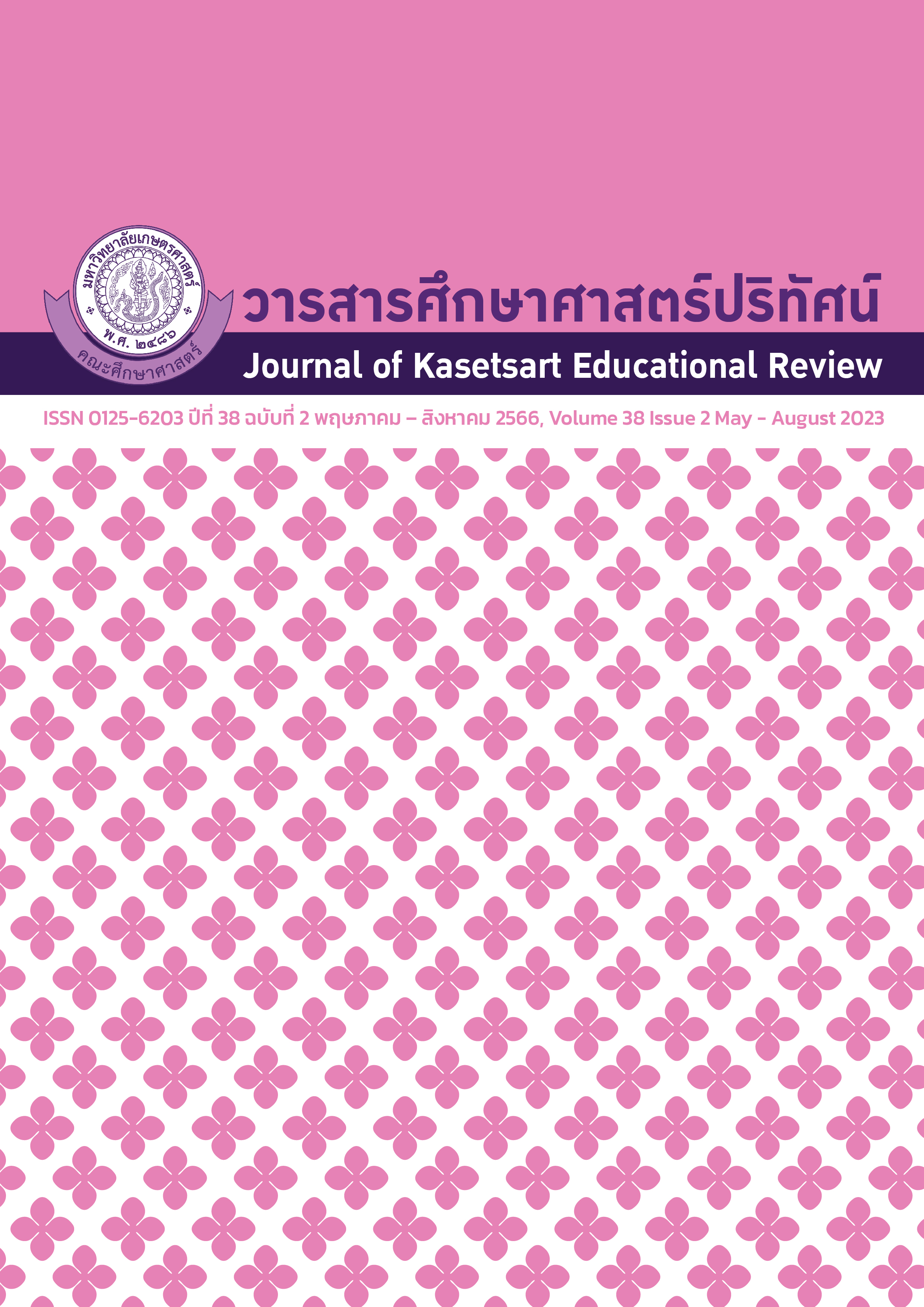ผลการจัดการเรียนรู้แบบสืบเสาะหาความรู้ (5Es) ร่วมกับห้องเรียนกลับด้าน เพื่อพัฒนาผลสัมฤทธิ์ทางการเรียนและความสามารถในการคิดวิเคราะห์ เรื่อง เคมีไฟฟ้า ของนักเรียนชั้นมัธยมศึกษาปีที่ 6
คำสำคัญ:
การจัดการเรียนรู้แบบสืบเสาะหาความรู้, ห้องเรียนกลับด้าน, ผลสัมฤทธิ์ทางการเรียน, ความสามารถในการคิดวิเคราะห์บทคัดย่อ
การวิจัยครั้งนี้มีวัตถุประสงค์เพื่อ 1) เพื่อเปรียบเทียบผลสัมฤทธิ์ทางการเรียนก่อนเรียนและหลังเรียนของนักเรียนชั้นมัธยมศึกษาปีที่ 6 เรื่อง เคมีไฟฟ้า ด้วยการจัดการจัดการเรียนรู้แบบสืบเสาะหาความรู้ (5Es) ร่วมกับห้องเรียนกลับด้าน 2) เพื่อศึกษาความสามารถในการคิดวิเคราะห์หลังเรียนของนักเรียนชั้นมัธยมศึกษาปีที่ 6 เรื่อง เคมีไฟฟ้า ด้วยการจัดการจัดการเรียนรู้แบบสืบเสาะหาความรู้ (5Es) ร่วมกับห้องเรียนกลับด้าน กลุ่มตัวอย่าง คือ นักเรียนชั้นมัธยมศึกษาปีที่ 6/5 จำนวน 24 คน ซึ่งได้มาจากการสุ่มอย่างง่าย เครื่องมือที่ใช้ในการวิจัยประกอบด้วย
1) แบบทดสอบวัดผลสัมฤทธิ์ทางการเรียน 2) แบบทดสอบวัดความสามารถในการคิดวิเคราะห์ ผลการวิจัยพบว่านักเรียนที่ได้รับการจัดการเรียนรู้แบบสืบเสาะหาความรู้ (5Es) ร่วมกับห้องเรียนกลับด้าน มีผลสัมฤทธิ์ทางการเรียนหลังการจัดการเรียนรู้ ( = 22.52, S.D. = 2.55) สูงกว่าก่อนการจัดการเรียนรู้ (
= 8.54, S.D. = 4.75) อย่างมีนัยสำคัญทางสถิติที่ระดับ 0.05 และนักเรียนที่ได้รับการจัดการเรียนรู้แบบสืบเสาะหาความรู้ (5Es) ร่วมกับห้องเรียนกลับด้าน มีความสามารถในการคิดวิเคราะห์โดยรวมอยู่ในระดับปานกลาง (
= 12.63, S.D. = 3.52) และนักเรียนที่มีความสามารถในการคิดวิเคราะห์ระดับดีขึ้นไปร้อยละ 41.67
เอกสารอ้างอิง
Academic and Educational Standards, Bureau. (2009). Indicators and core learning subjects for science learning subjects according to the basic education core curriculum. Ministry of Education.
Aksornkan, S. (2019). Analytical Thinking: Development of Literature Circles and Higher Order Question. Suratthani Rajabhat Journal. 7(1), 35-62. [in Thai]
Atisabda, W. (2003). WebQuest: Classes that organize learners are organized on the World Wide Web. Prince of Songkla University Journal of Academic Resources, 14(2). [in Thai]
Bergmann, J. and Sams, A. (2012). Flip Your Classroom Reach Every Student in Every Class Every Day. International Society for Technology in Education.
Bloom, B. S. (1956). Taxonomy of educational objectives: Handbook I: Cognitive domain. David McKay.
Bumrungudomrat, P. and Wutchana, U. (2021). The 5E of Inquiry-based Learning Incorporating Online Classroom Using Google Sites in term of Chemical Equilibrium of Grade 11 Students. NEU ACADEMIC AND RESEARCH JOURNAL. 11(1), 260-274. [in Thai]
Institute for the Promotion of Teaching Science and Technology (NSTDA). (2003). Organizing learning subjects for science groups Basic education courses. Teachers Council of Thailand Trade Organization. [in Thai]
Jadeerat, P., Prasitpong, S. and Vanichanon, A. (2020). The Development of Analytical Thinking Skill of 10th Grade Students by Using Inquiry Approach with Questioning Techniques. Journal of Education, Prince of Songkla University, Pattani Campus, 32(1), 61-75.
Khammanee, T. (2013). Pedagogy and knowledge for effective learning process management. Chulalongkorn University Press. [in Thai]
Limvong, T. and Saengri Y. (2019). Flipped Classroom: new learning for 21st Century Skills. Mahidol R2R e-Journal, 6(2), 9-17 https://doi.org/10.14456/jmu.2019.10. [in Thai]
National Institute of Educational Testing Service. (2020). Historical O-NET Statistics. https://www.niets.or.th/th/content/view/11821. [in Thai]
National Institute of Educational Testing Service. (2021). General subjects, academic year 2021. https://www.niets.or.th/th/content/view/18805. [in Thai]
Pimwan, C. (2019). The 5Es Flipped Classroom for Promoting Critical Thinking Skills and Learning Achievement on the Properties of Genetic Material and Mutation of Grade 12 Student. [Unpublished master’s thesis]. Rajabhat Maha Sarakham University.
Saa, A. (2016). Effect of Flipped Classroom on Learning Achievement, Analytical Thinking Skills and Instructional Satisfaction of Grade 11 Students. http://kb.psu.ac.th/psukb/handle/2016/11074. [in Thai]
Soikudreua, N., & Dokmai, P. (2021). The Open-ended Inquiry Process of Flipped Classroom for High-Order Thinking Skills Enhancing of the 11th Grade Students. Journal of Education Rajabhat Maha Sarakham University, 18(2), 151–164. https://so06.tci-thaijo.org/index.php/ edu-rmu/article/view/252564. [in Thai]
Sukontorn, B. and Chittradub, S. (2020). Guidelines of Using the Flipped Classroom in Chemistry Instruction for Upper-Secondary Students with Low Achievement. KKU Research Journal (Graduate Studies) Humanities and Social Sciences, 8(1), 13–25. https://so04.tci-thaijo.org/index.php/gskkuhs/article/view/241431. [in Thai]
Tagaew, A. (2021). The development of learning activities packages on elements and compounds by inquiry-based learning incorporated with flipped classroom for grade-10 students. Journal of Science and Science Education, 4(1), 72-83. [in Thai]
Thongngam P. (2012). Finding the efficiency of innovation. https://kroopisit.wordpress.com/2012/05/23/
ดาวน์โหลด
เผยแพร่แล้ว
ฉบับ
ประเภทบทความ
สัญญาอนุญาต
ลิขสิทธิ์ (c) 2023 วารสารศึกษาศาสตร์ปริทัศน์

อนุญาตภายใต้เงื่อนไข Creative Commons Attribution-NonCommercial-NoDerivatives 4.0 International License.
บทความทุกบทความเป็นลิขสิทธิ์ของวารสารคณะศึกษาศาสตร์ มหาวิทยาลัยเกษตรศาสตร์ วิทยาเขตบางเขน
วารสารศึกษาศาสตร์ปริทัศน์ (Kasetsart Educational Review)






